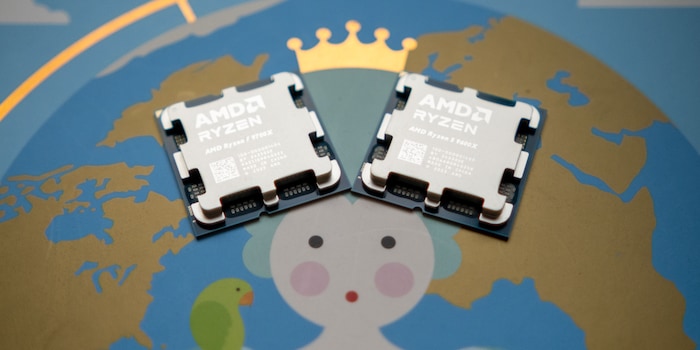

Ryzen 9700X and 9600X review roundup: AMD takes the single-core crown
Over a week later than originally planned, the first Ryzen 9000 series processors are finally being released: the Ryzen 5 9600X and the Ryzen 7 9700X. The smaller model is particularly impressive in initial tests.
After almost two years of waiting, the new generation of Ryzen processors is finally being released. This after the launch was postponed due to problems with AGESA – part of the BIOS. According to German tech magazine ComputerBase, it’s AMD’s worst launch in this area since Zen 1. Certain modules didn’t want to run with the original AGESA. Five BIOS updates within a week were necessary to remedy the situation. A release on the planned launch date would’ve been a disaster, according to tester Volker Risska. However, further updates are likely to follow.
One major change compared to the previous generation is the lower TDP: 65 watts for the Ryzen 5 9600X and Ryzen 7 9700X. With the predecessors, it was 105 watts. You should always keep this lower TDP in mind when looking at the results. The new CPUs can often get more out of less, but not always. Here’s an overview of the reviews from ComputerBase, TechPowerUp and Tom’s Hardware.
Gaming
In ComputerBase’s gaming test (in German), the Ryzen 5 9600X outperformed its predecessor, the Ryzen 5 7600X, by an average of nine per cent in the 13 test games. The Ryzen 7 9700X is seven per cent stronger than its predecessor, the Ryzen 7 7700X. AMD said in advance that it’d even beat its own X3D chips. But according to ComputerBase, this isn’t the case. The Ryzen 7 7800X3D is still the best choice for gaming, 13 per cent ahead of the Ryzen 7 9700X.
TechPowerUp came to somewhat different conclusions. The Ryzen 5 9600X, for example, delivers one of the best gaming performances of all AMD CPUs to date according to them – only the 7800X3D is even better. Even the best Intel CPUs are within reach with two to five per cent stronger performance. The Ryzen 7 9700X delivers two per cent more frames per second than the smaller model.
Tom’s Hardware has similar praise for the Ryzen 5 9600X. The chip sets new standards for mid-range gaming PCs. This CPU is an obvious recommendation in that segment. The Ryzen 7 9700X, on the other hand, can’t keep up in terms of price compared to the even faster Ryzen 7 7800X3D.
Office use
According to ComputerBase, AMD is the new king of the single core. No other one is faster than the new Ryzen 9000. The 9700X and 9600X achieve between 14 and 16 per cent higher performance than their predecessors. The fact that even Intel was beaten is a resounding success. In the single-core segment, AMD has so far been outperforming the competition.
In applications requiring several cores, however, the lower TDP puts a damper on the CPUs. The 9700X is only two per cent more powerful than its predecessor. With the lower TDP, that is. If the processor is clocked to the same TDP as its predecessor, it’s 14 per cent better. Even with the standard TDP of 65 watts, the Ryzen 5 9600X is nine per cent stronger than its predecessor, which runs at 105 watts.
TechPowerUp, on the other hand, can only measure a seven per cent increase in applications with the 9600X. Even overclocking the CPU to 105 watts only increases the performance by 2.4 per cent.
Intel CPUs are still significantly better in multi-core applications than those from AMD according to Tom’s Hardware. For example, the i5-14600K is on average 26 per cent faster than the Ryzen 9600X, and the i7-14700K is 41 per cent faster than the Ryzen 7 9700X
Efficiency
According to TechPowerUp, the Ryzen 5 9600X and Ryzen 7 9700X are extremely energy efficient. On average, the 9600X consumes 60 watts over 49 applications. With the 9700X, it’s 61 watts. That’s 30 watts less than the i5-14600K from Intel and 16 per cent less than the 7600X. The tester welcomes a TDP of 65 watts for the 9600X, but would’ve liked a slightly higher TDP for the 9700X to promote higher performance gains compared to the predecessor.
ComputerBase and Tom’s Hardware also praise the energy efficiency of the new Ryzen 9000. Especially compared to Intel, it’s top of the class.
Price
These reviews highlight the Ryzen 5 9600X as a good or even the best choice for mid-range gaming PCs. For other applications, however, the Intel i5-14600K or i5-13600K is the better choice. Its significantly cheaper predecessor could also score points here.
The Ryzen 7 9700X has a trickier standing. It’s rather expensive compared to its predecessor and the competition.
From big data to big brother, Cyborgs to Sci-Fi. All aspects of technology and society fascinate me.
Interesting facts about products, behind-the-scenes looks at manufacturers and deep-dives on interesting people.
Show all


